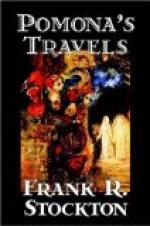Mr. Poplington was very pleasant and chatty, and of course asked a great many questions about America. Nearly all English people I’ve met want to talk about our country, and it seems to me that what they do know about it isn’t any better, considered as useful information, than what they don’t know. But Mr. Poplington has never been to America, and so he knows more about us than those Englishmen who come over to write books, and only have time to run around the outside of things, and get themselves tripped up on our ragged edges.
He said he had met a good many Americans, and liked them, but he couldn’t see for the life of him why they do some things English people don’t do, and don’t do things English people do do. For instance, he wondered why we don’t drink tea for breakfast. Miss Pondar had made it for him, knowing he’d want it, and he wonders why Americans drink coffee when such good tea as that was comes in their reach.
Now, if I had considered Mr. Poplington as a lodger it might have nettled me to have him tell me I didn’t know what was good, but remembering that we was giving him hospitality, and not board, and didn’t intend to charge him a cent, but was just taking care of him out of neighborly kindness, I was rather glad to have him find a little fault, because that would make me feel as if I was soaring still higher above him the next morning, when I should tell him there was nothing to pay.
So I took it all good-natured, and said to him, “Well, Americans like to have the very best things that can be got out of every country. We’re like bees flying over the whole world, looking into every blossom to see what sweetness there is to be got out of it. From the lily of France we sip their coffee, from the national flower of India, whatever it is, we take their chutney sauce, and as to those big apple tarts, baked in a deep dish, with a cup in the middle to hold up the upper crust, and so full of apples, and so delicious with Devonshire clotted cream on them that if there was any one place in the world they could be had I believe my husband would want to go and live there forever, they are what we extract from the rose of England.”
Mr. Poplington laughed like anything at this, but said there was a great many other things that he could show us and tell us about which would be very well worth while sipping from the rose of England.
After breakfast he went to church with us, and as we was coming home—for he didn’t seem to have the least idea of going to the inn for his luncheon—he asked if we didn’t find the services very different from those in America.
“Yes,” said I, “they are about as different from Quaker services as a squirting fountain is from a corked bottle. The Methodists and Unitarians and Reformed Dutch and Campbellites and Hard-shell Baptists have different services too, but in the Episcopal churches things are all pretty much the same as they did this morning. You forget, sir, that in our country there are religions to suit all sizes of minds. We haven’t any national religion any more than we have a national flower.”




